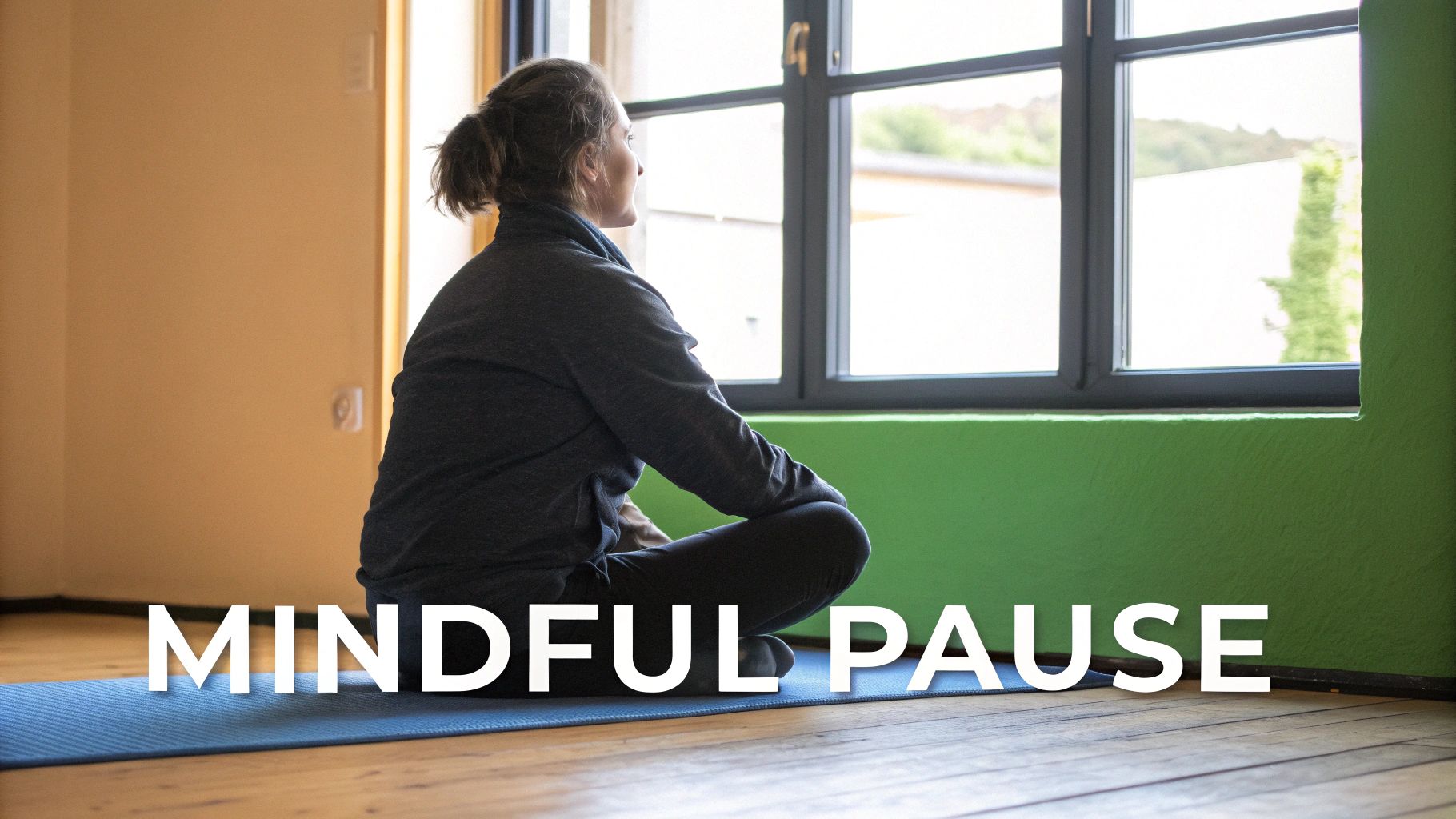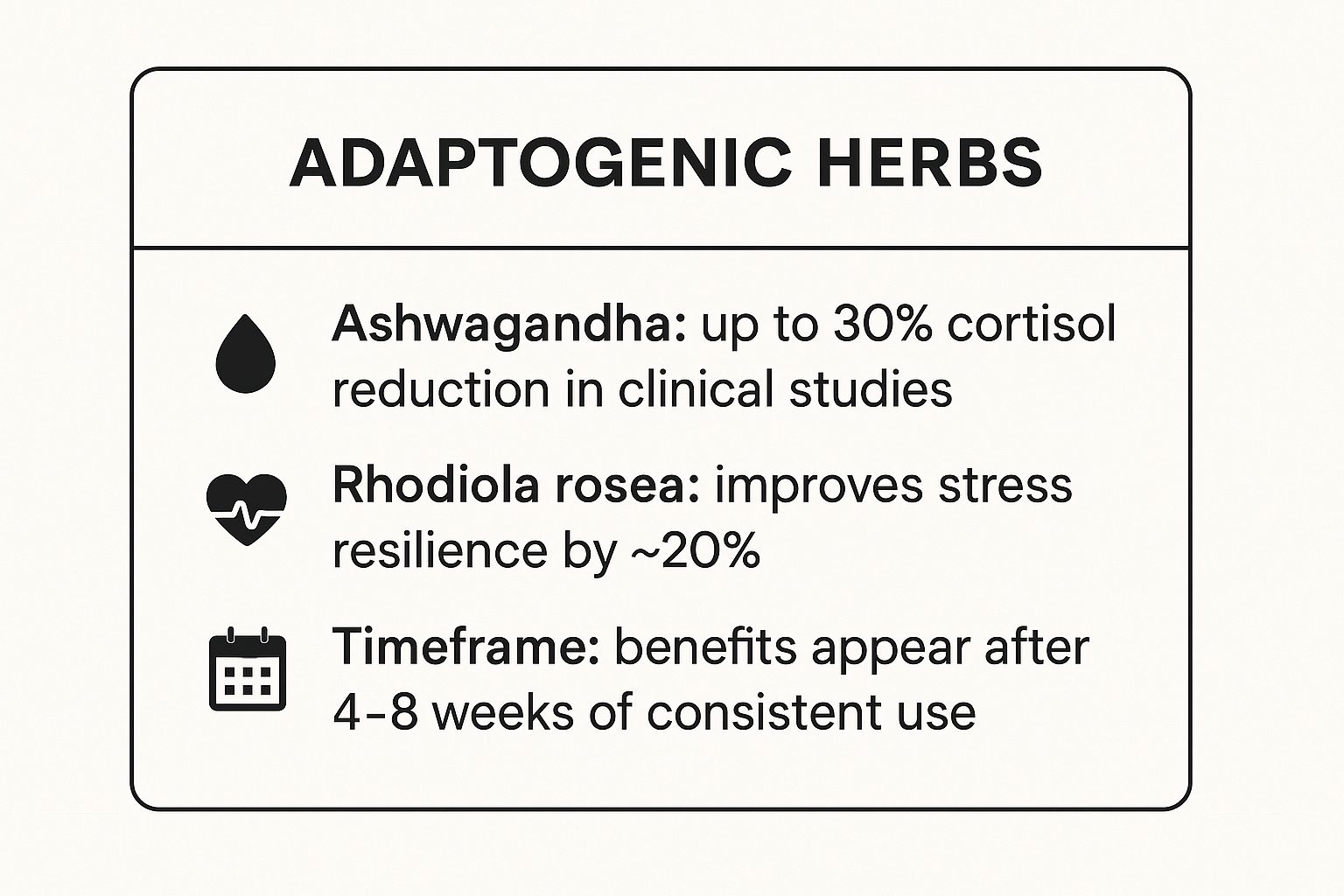In our fast-paced world, chronic stress has become a silent epidemic, with its primary accomplice being the hormone cortisol. While essential in small doses for our 'fight or flight' response, persistently high cortisol levels can disrupt nearly every process in your body, from sleep and mood to immunity and metabolism. That feeling of being constantly 'wired' isn't just in your head; it's a physiological state driven by this powerful stress hormone. Managing it is fundamental to your overall wellbeing.
The good news is that you have significant control over this process. This guide moves beyond generic advice like 'just relax', offering a comprehensive list of actionable strategies to help you find balance. We will explore a range of practical and sustainable natural ways to reduce cortisol, equipping you with the tools needed to build lasting resilience. From specific dietary choices and targeted supplements to powerful mindfulness techniques and the benefits of spending time in nature, you will learn how to actively lower your stress baseline. These evidence-backed methods are designed to empower you to reclaim your calm, enhance your energy, and support your body’s natural equilibrium. Let's begin.
1. Meditation and Mindfulness Practices
Meditation and mindfulness are powerful techniques to train your attention, achieve mental clarity, and calm your emotional state. By regularly engaging in these practices, you actively switch on your body's relaxation response, which directly counteracts the "fight or flight" mechanism that floods your system with cortisol. This makes it one of the most effective natural ways to reduce cortisol.

The science is compelling: consistent meditation can rewire your brain's stress pathways, making you more resilient over time. A landmark eight-week study from Harvard Medical School found that mindfulness meditation participants experienced an average cortisol reduction of 23%. Similarly, Google's "Search Inside Yourself" corporate mindfulness programme helped employees reduce their perceived stress by 34%, demonstrating the real-world impact of these ancient practices in modern, high-pressure environments.
Your Action Plan for Meditation and Mindfulness
Getting started is simpler than you might think. Focus on building a consistent daily habit.
- Start with 5-10 Minutes: Begin with just five to ten minutes each day. The goal is to build a sustainable habit, not to achieve a perfect meditation session.
- Use Guided Meditation Apps: Download an app like Headspace or Calm. These platforms, popularised by pioneers such as Jon Kabat-Zinn, provide structured guidance that is perfect for beginners.
- Focus on Your Breath: Sit comfortably and focus on the sensation of your breath entering and leaving your body. When your mind wanders, gently guide your focus back to your breath without judgement.
- Schedule Your Practice: Practice at the same time each day, like first thing in the morning or just before bed. This integrates the habit into your routine and signals to your body that it's time to relax.
2. Regular Physical Exercise
Physical exercise is a powerful regulator of stress hormones. While intense activity causes a temporary, healthy spike in cortisol, consistent moderate exercise improves your baseline cortisol levels and enhances your stress recovery. This controlled physical stress teaches your body to handle real-life stressors more efficiently, making it one of the most effective natural ways to reduce cortisol.

The evidence strongly supports the link between movement and hormonal balance. For instance, studies at the Mayo Clinic have shown that just 30 minutes of daily walking can lead to a 15% reduction in cortisol levels. Similarly, research from Yale University highlighted yoga's powerful effect, demonstrating a 20% decrease in cortisol among participants. These findings are echoed in corporate wellness programmes, where companies have reported up to a 25% reduction in perceived stress and burnout by providing employees with on-site fitness opportunities, proving that integrating activity is key to managing stress.
Your Action Plan for Regular Exercise
Find a sustainable routine that works for you, focusing on consistency rather than extreme intensity.
- Hit Your Weekly Target: The NHS recommends at least 150 minutes of moderate-intensity activity a week. Achieve this with five 30-minute sessions of brisk walking, cycling, or swimming.
- Mix Cardio and Strength: Incorporate a mix of cardiovascular exercises (like running or dancing) to improve heart health and strength training (like weightlifting or bodyweight exercises) to build resilient muscle mass.
- Exercise Early in the Day: Try to complete your workout earlier in the day. An intense evening session can sometimes interfere with your natural cortisol dip, which is necessary for restful sleep.
- Listen to Your Body: Avoid overtraining, which can chronically elevate cortisol. If you feel constantly fatigued or sore, take a rest day. Recovery is part of the process.
- Choose an Activity You Enjoy: The best exercise is the one you'll stick with. Whether it's hiking, team sports, or a dance class, choosing something you love turns it from a chore into a hobby.
3. Adequate Sleep and Sleep Hygiene
Adequate sleep is a non-negotiable cornerstone for hormonal balance. During deep sleep, your system naturally resets its cortisol rhythm, allowing levels to drop to their lowest point. Disrupted or insufficient sleep throws this delicate cycle into chaos, leading to chronically elevated cortisol. This makes improving your sleep one of the most crucial natural ways to reduce cortisol.
The evidence is clear: sleep deprivation is a direct pathway to higher stress hormones. Research has shown that even one night of poor sleep can increase cortisol levels by up to 50% the following day. A landmark Stanford University study highlighted that participants who adopted a strict sleep hygiene protocol saw their daytime cortisol levels decrease by an average of 30%. Similarly, sleep optimisation programmes within the military have been directly linked to a reduction in stress-related incidents, underscoring the critical role of restorative rest in managing physiological stress.
Your Action Plan for Better Sleep
Optimize your sleep by creating powerful, consistent routines that signal to your brain and body that it is time to wind down.
- Stick to a Strict Schedule: Go to bed and wake up at the same time every day, even on weekends. This reinforces your body's natural sleep-wake cycle, or circadian rhythm.
- Create a Sleep Sanctuary: Make your bedroom a cool, dark, and quiet environment. Use blackout curtains, a white noise machine, or earplugs to eliminate disruptions.
- Implement a "Digital Sunset": Turn off all screens—phones, tablets, and TVs—at least 90 minutes before bed. The blue light they emit suppresses melatonin production, the hormone that signals sleep.
- Develop a Relaxing Ritual: Create a calming pre-sleep routine. Read a book, take a warm bath, perform gentle stretches, or listen to calming music to prepare your body for rest.
4. Strategic Nutritional Choices
The food you consume has a direct and profound impact on your cortisol levels. Strategic nutritional choices involve prioritising foods that stabilise blood sugar, reduce inflammation, and support your adrenal system. By adopting a nutrient-dense eating pattern, you can help regulate your stress response, making nutrition one of the most fundamental natural ways to reduce cortisol.
The scientific backing for this approach is strong. Studies on the Mediterranean diet, rich in healthy fats, fruits, and vegetables, have shown it can lead to a cortisol reduction of up to 20%. Similarly, research into traditional Japanese dietary patterns, which feature high consumption of green tea and omega-3-rich fish, has correlated these habits with lower perceived stress and reduced stress hormone levels. These findings highlight how a well-planned diet provides the building blocks your body needs to maintain resilience against stress.
Your Action Plan for Strategic Nutrition
Make targeted changes to your diet to yield significant results. Focus on nutrient quality and consistency.
- Prioritise Protein at Every Meal: Include a source of protein (e.g., lean meat, fish, eggs, legumes) with each meal to help stabilise blood sugar levels and prevent the cortisol surges that follow a high-sugar meal.
- Choose Complex Carbohydrates: Swap refined sugars and white flour for complex carbs like oats, quinoa, sweet potatoes, and whole grains. These provide a slow release of energy, promoting stable blood glucose.
- Eat Anti-inflammatory Foods: Actively add foods known for their anti-inflammatory properties, such as oily fish (salmon, mackerel), dark leafy greens, berries, and turmeric, to combat systemic inflammation linked to high cortisol.
- Limit Caffeine and Alcohol: Both substances can directly stimulate cortisol release and disrupt sleep. Reduce your intake, especially in the afternoon and evening. To discover more about how diet impacts your body's stress response, you can learn more about lowering cortisol levels naturally.
5. Social Connection and Support Systems
Humans are inherently social creatures, and cultivating strong relationships is a biological necessity for stress management. Meaningful social connections trigger the release of oxytocin, a hormone that directly counters the effects of cortisol. This emotional buffering makes building a robust support network one of the most fundamental natural ways to reduce cortisol.
The scientific backing for this is extensive and compelling. The landmark Framingham Heart Study demonstrated that strong social ties were linked to a 50% lower risk of stress-related diseases. Research from the world's Blue Zones consistently shows that tight-knit communities are a key factor in longevity and well-being. Even in professional settings, the impact is clear; corporate mentorship programmes have been shown to reduce employee stress by up to 35%, highlighting the power of connection.
Your Action Plan for Social Connection
Nurture your social health with deliberate, consistent effort. Focus on the quality of your interactions over the quantity of your contacts.
- Prioritise Face-to-Face Interaction: While digital communication is convenient, make time for in-person contact. It provides non-verbal cues and a deeper sense of connection that more effectively lowers cortisol.
- Practise Active Listening: When talking with someone, give them your full attention. Put your phone away, make eye contact, and engage with what they are saying to deepen your bond.
- Join a Group: Find a club or group based on a shared hobby, whether it's a book club, a hiking group, or a local sports team. Shared interests are a natural foundation for strong friendships.
- Schedule Social Time: Treat your relationships with the same importance as any other appointment. Schedule regular calls with family or weekly coffee meetups with friends to manage stress at work and in life.
6. Breathing Techniques and Breathwork
Controlled breathing directly shifts your nervous system from stress to calm. By consciously changing your breathing pattern, you can activate the vagus nerve and send a powerful signal of safety to your brain, lowering cortisol levels within minutes. This makes breathwork one of the most immediate and accessible natural ways to reduce cortisol.
The efficacy of breathwork is well-documented in high-stress environments. Elite performers, such as Navy SEALs, use "box breathing" to maintain composure and cognitive function under extreme pressure. Furthermore, clinical research supports this practice; hospital studies have demonstrated that structured breathing exercises can lead to a cortisol reduction of up to 25%. This ancient technique, popularised by modern experts like James Nestor and Wim Hof, offers a direct physiological lever to manage your body's stress response.
Your Action Plan for Breathwork
Integrate these simple breathing techniques into your day. The key is to make them an automatic response to rising stress.
- Use the Physiological Sigh: Take two sharp inhales through the nose followed by one long, slow exhale through the mouth. Repeat two to three times for an immediate calming effect, as popularised by neuroscientist Andrew Huberman.
- Practise Box Breathing: Inhale for a count of four, hold for four, exhale for four, and hold for four. This simple, rhythmic pattern is easy to remember and highly effective in moments of stress.
- Extend Your Exhale: To activate the relaxation response, make your exhale longer than your inhale. Start by inhaling for four seconds and exhaling for six seconds.
- Set Breathing Cues: Link your breathing practice to daily activities. For example, take three deep breaths every time you stop at a red light or before you open your email inbox to build a consistent habit.
7. Time in Nature and Forest Bathing
Spending time in natural environments is a deeply restorative practice that triggers a measurable reduction in stress hormones. This approach, popularised in Japan as shinrin-yoku or "forest bathing," works by calming the brain's stress centres and realigning our internal clocks. Engaging with the outdoors is one of the most profound natural ways to reduce cortisol.

The scientific backing for this practice is robust. Groundbreaking Japanese research led by figures like Yoshifumi Miyazaki has shown that as little as 15-20 minutes spent in a forest environment can lower cortisol concentrations by over 15%, decrease blood pressure, and boost immune cell activity. Similarly, a well-known Stanford University study found that a 90-minute walk in a natural setting decreased activity in the part of the brain linked to rumination and negative self-focus, a key driver of chronic stress. This highlights nature's direct impact on our physiological and mental well-being.
Your Action Plan for Forest Bathing
Integrate nature into your life with these intentional connection strategies.
- Aim for 120 Minutes Weekly: Spend at least two hours in nature per week. You can break this up into smaller sessions, like a 20-minute walk in a local park each day.
- Engage All Your Senses: Actively notice the scent of the soil, listen to the sound of birds, feel the texture of bark, and observe the way light filters through the leaves. This is the core of shinrin-yoku.
- Go on a Digital Detox: To fully benefit, leave your phone behind or switch it to silent. This allows your brain to rest and recover from constant digital stimulation.
- Try "Earthing": Also known as grounding, this involves direct skin contact with the earth's surface, like walking barefoot on grass or sand. Early research suggests this may help normalise cortisol rhythms.
8. Adaptogenic Herbs and Natural Supplements
Adaptogenic herbs are a unique class of plants that help regulate your body's central stress response system. Coined by Soviet scientist Dr. Nikolai Lazarev, the term 'adaptogen' refers to substances that support your body's natural ability to adapt to stress. These plants help normalise cortisol production, making them one of the most targeted natural ways to reduce cortisol.
The historical and clinical evidence is significant. Ayurvedic medicine has utilised herbs like ashwagandha for over 3,000 years to enhance resilience. Modern clinical trials have validated this ancient wisdom, with some studies showing ashwagandha can reduce cortisol levels by up to 30%. Similarly, research pioneered by Dr. Israel Brekhman demonstrated how rhodiola rosea helped Olympic athletes manage physical and mental stress, improving performance and recovery.
The infographic below summarises key data points on some of the most effective adaptogens for cortisol management.

These figures highlight not only the significant potential of specific herbs but also the importance of consistent, long-term use to achieve meaningful results.
Your Action Plan for Adaptogens
Successfully incorporate adaptogens with this thoughtful and consistent approach.
- Choose Standardised Extracts: Opt for high-quality supplements from reputable brands that use standardised extracts. This ensures you receive a consistent and effective dose of the active compounds.
- Start with a Low Dose: Begin with the lowest recommended dose on the product label and gradually increase it as needed. This allows your body to adjust.
- Be Patient and Consistent: Take adaptogens consistently for at least four to eight weeks before assessing their effects. They work by restoring balance over time, not providing an instant fix.
- Consider Cycling On and Off: To maintain effectiveness, many practitioners recommend cycling adaptogens. A common cycle is three months on, followed by one month off.
- Consult a Professional: Always speak with a healthcare provider or a qualified herbalist before starting any new supplement, especially if you have pre-existing health conditions or are taking other medications. You can learn more about ashwagandha's role in stress reduction to better understand its specific benefits.
Natural Cortisol Reduction Methods Comparison
| Item | Implementation Complexity 🔄 | Resource Requirements 💡 | Expected Outcomes ⭐📊 | Ideal Use Cases 💡 | Key Advantages ⚡⭐ |
|---|---|---|---|---|---|
| Meditation and Mindfulness Practices | Moderate - requires consistent practice | Low - no equipment, can use apps | 20-30% cortisol reduction in 8 weeks | Stress management, mental health improvement | Free, accessible, rewires brain stress response |
| Regular Physical Exercise | Moderate - time commitment and effort | Moderate - time, suitable space/equipment | 15-25% cortisol reduction, improves fitness | Physical and mental stress relief | Dual benefit: fitness + stress reduction, mood boost |
| Adequate Sleep and Sleep Hygiene | Low to Moderate - lifestyle habit changes | Low - no cost, environment adjustments | Up to 30% cortisol reduction with good hygiene | Essential for recovery, hormonal balance | Natural process, improves overall health |
| Strategic Nutritional Choices | Moderate - planning and dietary changes | Moderate - quality food and prep | ~20% cortisol reduction, metabolic health gains | Long-term stress regulation, overall wellness | Sustainable, multiple health benefits |
| Social Connection and Support Systems | Moderate - time and emotional investment | Low to Moderate - social engagement | 23-50% cortisol reduction with strong bonds | Emotional support, resilience, life satisfaction | Natural, enjoyable, improves life satisfaction |
| Breathing Techniques and Breathwork | Low - easy to learn, consistent use needed | Very Low - no equipment | Rapid cortisol reduction (within minutes) | Immediate stress relief, anytime/anywhere use | Instant relief, simple, portable |
| Time in Nature and Forest Bathing | Low - depends on access to nature | Low to Moderate - time and location | 15-20% cortisol reduction in 15+ minutes | Urban stress, mental fatigue, immune boost | Pleasant, combines physical & mental benefits |
| Adaptogenic Herbs and Natural Supplements | Moderate - dosage management, patience needed | Moderate to High - supplement costs | Up to 30% cortisol reduction over weeks/months | Hormonal balance support, chronic stress | Natural, gradual, traditional use, combo-friendly |
Your Personalised Plan for Cortisol Control
Navigating the world of stress management can often feel overwhelming, but as we've explored, you have a powerful arsenal of natural ways to reduce cortisol at your disposal. The journey to hormonal balance isn't about a single, miraculous fix. Instead, it’s about creating a personalised, sustainable framework that integrates seamlessly into your life. The true power lies in the synergy of these strategies, where consistent, small actions compound over time to produce profound results.
We’ve covered a spectrum of evidence-backed methods, from the immediate calm of deep breathing exercises to the long-term resilience built through regular physical activity. We’ve seen how strategic nutritional choices can fortify your body against stress and how the simple act of spending time in nature can recalibrate your nervous system. Each of these pillars, whether it's prioritising sleep hygiene, fostering meaningful social connections, or exploring powerful adaptogens, offers a unique pathway to lower cortisol levels and enhance your wellbeing.
Crafting Your Action Plan
The key is not to implement everything at once. This approach can, paradoxically, create more stress. Instead, the most effective strategy is to start small and build momentum. Think of it as a bespoke programme designed by you, for you.
- Step 1: Identify Your Easiest "Win". Look back at the list of strategies. Which one feels most achievable and appealing right now? Is it a ten-minute guided meditation before bed? Or perhaps swapping your afternoon coffee for a calming herbal tea? Choose one single action to focus on for the next week.
- Step 2: Schedule It. Don't just intend to do it; schedule it. Put that ten-minute walk in your calendar. Set a recurring alarm for your new bedtime. Treating this new habit with the same importance as a work meeting makes it tangible and far more likely to stick.
- Step 3: Layer and Combine. Once your first habit feels natural, introduce a second. Notice how these strategies can complement each other. For example, combine physical exercise with time in nature by going for a run in a local park. Or pair a healthy, magnesium-rich meal with a post-dinner chat with a loved one.
By taking this measured, intentional approach, you are not just ticking boxes. You are actively rewiring your body's response to stress, building a foundation of resilience that will serve you across all areas of your life. Mastering these natural ways to reduce cortisol is an investment in your cognitive function, physical vitality, and emotional equilibrium. It's about reclaiming your energy and thriving, not just surviving. The goal is to create a lifestyle where balance is the default, not a constant struggle.
Ready to amplify your efforts with a powerful, natural adaptogen? Oji Shilajit offers a pure and potent source of fulvic acid and over 84 essential minerals, helping to support your body's natural resilience to stress. Integrate it into your new routine and discover a deeper level of balance and vitality. Explore the benefits at Oji Shilajit today.








